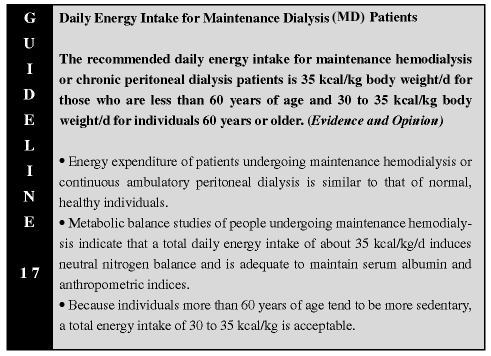
3. Management of Protein and Energy Intake

Longitudinal and cross-sectional data indicate that MD patients frequently have low energy intake and are underweight, often despite receiving apparently adequate dialysis therapy.128,153 Low body weights (adjusted for height, age, and gender) are associated with increased mortality rates in MD patients.15,50,85,86 Hence, it would seem important to aggressively attempt to maintain adequate energy intakes.
Dietary energy requirements have been studied in MHD patients under metabolic balance conditions. Dietary energy requirements were examined in six MHD patients while they ingested diets providing 25, 35, and 45 kcal/kg/d and a DPI of 1.13 g/kg/d for 21 days each. These studies indicated that the mean energy intake necessary to maintain both neutral nitrogen balance and unchanging body composition was about 35 kcal/kg/d.58 The finding that energy expenditure in MHD and CPD patients appears to be normal corroborates the observations from the aforementioned nitrogen balance and body composition studies.154-157
Based on the aforementioned studies, it is recommended that MHD patients consume a diet with a total daily energy intake of 35 kcal/kg body weight/d. For CPD patients, the recommended total daily energy intake, including both diet and the energy intake derived from the glucose absorbed from peritoneal dialysate, should be 35 kcal/kg/d. Most of the patients who participated in these studies were younger than 50 years of age, and this recommendation is therefore made only for individuals less than 60 years of age. Because older age may be associated with reduced physical activity and lean body mass, a daily energy intake of 30 to 35 kcal/kg/d for older patients with more sedentary lifestyles is acceptable. These recommendations are approximately the same as those for normal adults of the same age who are engaged in mild daily physical activity as indicated in the Recommended Dietary Allowances (RDA).158
Many patients will be unable to attain these recommended energy intakes. For individuals who are unable to consume an adequate energy intake, intensive education and dietary counseling by a trained dietitian should be undertaken. If this strategy is unsuccessful, oral nutritional supplements that are high in energy are recommended. Tube feedings and parenteral nutrition may also be considered (Guideline 19). Obese patients may not require as much energy per kilogram of body weight as nonobese patients (Guideline 12).